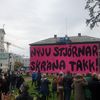27.2.2009 | 11:01
From the euobserver.com. Nordic Council recomends that Nordic states reconsider joining the € zone and the EU
Nordic Council report backs EU and euro entry - 27.02.2009 -
---------------------------------------------------------------------
As the prime ministers of all the Nordic countries met in Iceland to discuss the financial crisis, a report published by the Nordic Council on Wednesday said the crisis should lead to a review of whether all Nordic states should join the eurozone and the EU
Link to the news
http://euobserver.com/9/27684/?rk=1
ARTICLE FROM THE EUOBSERVER.COM
EUOBSERVER / BLAA LONID - As the prime ministers of all the Nordic countries met in Iceland to discuss the financial crisis, a report published by the Nordic Council on Thursday (26 February) said the crisis should lead to a review of whether all Nordic states should join the eurozone and the EU.
"The experience of the Nordic countries in the current crisis ...leads to a need to review whether the other Nordic countries would be better off to follow the Finnish example and join the euro-zone," reads the Nordic Globalisation Barometer 2009 report, Global Pressure - Nordic Solutions?
The Nordic Council of Ministers, bringing together the premiers of all the Nordic countries as well as delegations from associate members Greenland, the Faroe Islands and the Aland Islands, is currently meeting just outside Reykjavik for its second annual globalisation forum.
Finland is the sole Nordic nation to belong to both the EU and the eurozone. Sweden and Denmark are also members of the bloc, but have maintained their domestic currencies. Norway and Iceland remain outside both.
Although this year's themes were intended to be innovation and climate change, the focus has been hi-jacked by the mounting economic crisis, with the Icelandic venue for the meeting only highlighting the situation, as delegates passed "Liquidation" and "Closing Down Sale" signs plastered on shops surrounding their hotels.
Also focussing minds at the event, the Swedish krona fell to a fresh all-time low against the euro on Wednesday.
The report, authored by Christian Ketels of the Harvard Business School and the Stockholm School of Economics, reflects the views of the authors and not the official line of the Nordic Council.
"The Nordic countries will have to discuss whether the changes in the global economy suggest more fundamental changes in their economic policy architecture," it said. "The balance of costs and benefits from operating an independent currency and staying outside the European Union might have shifted."
The prime ministers themselves, all personally backers of both euro and EU membership, spent time discussing their options on Wednesday, but, apart from Finland, face considerable political obstacles on the EU path.
"We find ourselves in the situation where Sweden in 2003 held a referendum [on the euro] and the answer was 'No.' The party chair [of the governing coalition senior partner, the centre-right Moderate Party] has said that he understands that to be a '10-year No,' and the opposition leader said she also doesn't expect a return to the question until 2014," Sweden's prime minister, Fredrik Reinfeldt, said.
"However, the crisis has effected considerable change," he added. "So we are following the ongoing discussions in Denmark very closely."
A referendum on the introduction of the euro in Denmark is expected some time ahead of the next general election, due in 2011.
"We have announced we want a referendum at some point in this term of office," Danish prime minister Anders Fogh Rasmussen told reporters. "But the question is when, and we need clarification of the situation first, which means how the Irish referendum falls out."
Ireland will hold another referendum on the EU's Lisbon treaty later this year, after having rejected it first time around in June.
Norway's premier, Jens Stoltenberg, issued a curt "We lost a referendum on the EU and so it is not on the agenda now."
Oslo has held two referendums on the matter, one in 1974 after negotiating an accession agreement and another in 1994. Both times membership was narrowly rejected.
Icelandic Prime Minister Johanna Sigurdardottir said that as part of the coalition agreement her centre-left Social Democratic Alliance had signed with the far-left Left Green Movement, the current caretaker government would not apply for membership of the EU.
"But let's see what happens after the elections," she said. "At the same time, we need 30,000 Icelanders to demand a referendum."
Nordic Council secretary-general Asgrimsson, asked about previous remarks that Iceland would join the EU by 2015, said: "I believed it then and I believe it even more now."
Flokkur: Stjórnmál og samfélag | Facebook


 axelaxelsson
axelaxelsson
 agbjarn
agbjarn
 bjarnimax
bjarnimax
 eyvar
eyvar
 rustikus
rustikus
 einarbb
einarbb
 eirikuro
eirikuro
 eyrun
eyrun
 iador
iador
 himmalingur
himmalingur
 ingibs
ingibs
 islandshreyfingin
islandshreyfingin
 fun
fun
 jevbmaack
jevbmaack
 jonasantonsson
jonasantonsson
 nonniblogg
nonniblogg
 jonvalurjensson
jonvalurjensson
 juliusvalsson
juliusvalsson
 photo
photo
 krisjons
krisjons
 margretsverris
margretsverris
 omarbjarki
omarbjarki
 oskvil
oskvil
 ragjo
ragjo
 redlion
redlion
 sjos
sjos
 siggi-hrellir
siggi-hrellir
 siggith
siggith
 savar
savar
 valli57
valli57
 tbs
tbs





Bćta viđ athugasemd [Innskráning]
Ekki er lengur hćgt ađ skrifa athugasemdir viđ fćrsluna, ţar sem tímamörk á athugasemdir eru liđin.